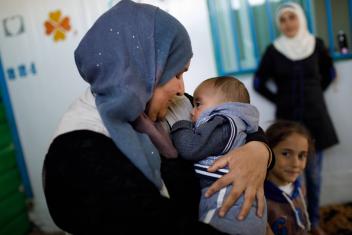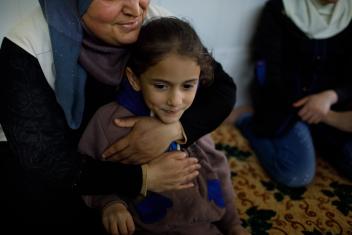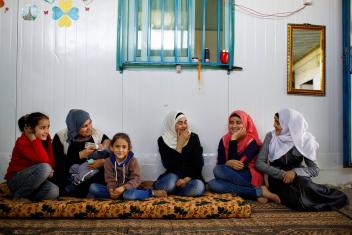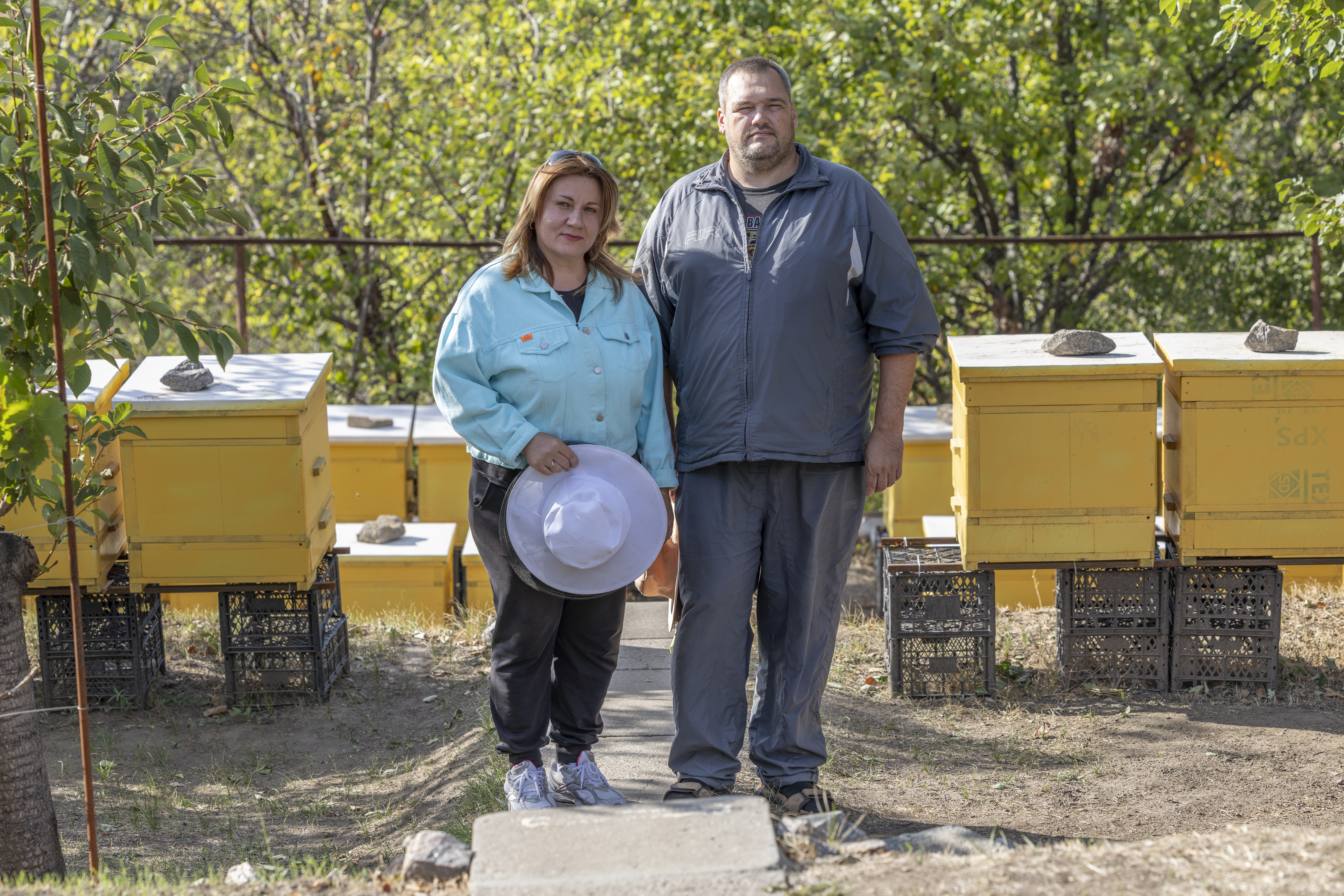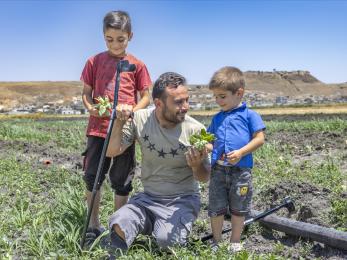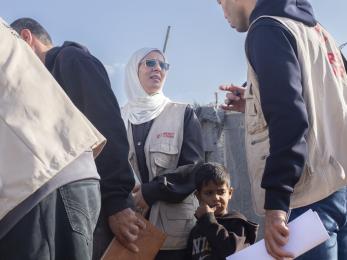For refugees in Jordan, two months became five years
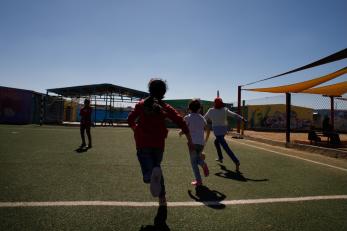
This story is part of our special series, 7 for 7: Seven voices for seven years of the Syria crisis. View the complete series here ▸
Early one morning in 2013, 31-year-old Ibrahim Khalil Mansour, a police officer in Damascus, woke his four children and told them to prepare to leave their home. They were going as a family to visit the children’s grandfather in Daraa, a city in Syria 70 miles south. But something was wrong. It was still dark outside, the sun not yet up. No one was allowed to bring anything with them. All family documents were left behind.
Ibrahim and his wife, Hayfaa, moved quickly, gathering everyone together so they could begin the journey on foot before sunrise. Life in Damascus had rapidly deteriorated as Syria’s conflict closed in. It was too dangerous to stay another day, and so together they had made the excruciating choice to flee. In the darkness, they moved as fast and as quietly as possible.
“I was terrified,” Hayfaa says. “I wasn’t terrified to die. I was terrified for my kids. I was scared maybe I would lose one of them. … I just wanted to hold them in my arms and save them from everything. From dying, from the bombing.”
They found safety in Daraa, but nothing else. Ibrahim had no job and the family had nowhere to live. Without money coming in, they needed another option for refuge. So shortly after, the family made their way a few miles south to the Jordanian border, entered the country as refugees, and settled in Zaatari camp an hour away.
They would be home, Ibrahim figured, in about 10 days.
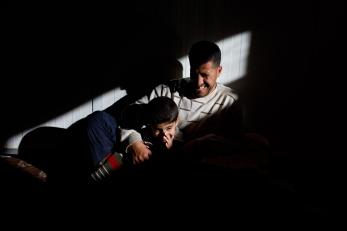
At the start of 2013, Zaatari was a dusty tent camp that held about 65,000 Syrian refugees. By March, the population had surged to 156,000, more than double its intended capacity. Today it is a semi-permanent settlement, with a hospital, 29 schools, and a busy main avenue residents refer to as the “Champs-Élysées,” lined with some of the 3,000 refugee-operated businesses that exist in the camp.
Nearly half a million refugees have passed through, including Ibrahim’s family, who are still there.
“We planned to stay here for one month, maximum. Two weeks to one month,” he says. “Looking at the situation in Syria … nobody was providing a solution. Everybody was expanding the conflict. When we saw that, we knew we were going to stay here longer.”
It is hard to express how it feels for two weeks to become five years, other than to say you feel time pass profoundly. Summer slides into winter, one day-labor job dissolves into another, 2-year-old Khalil sprouts into a boy now nearly 8. That is how life feels to Ibrahim now, a blurred sequence of milestones he is both incredibly thankful and deeply sad to have lived here.
These are the two ways to look at his situation, and talking to Ibrahim, you can hear him struggle to possess them both. As a refugee, you have to make incredible sacrifices for the safety of your family. The home you built, the career you earned, the dreams you cherished — he has longed for these things to return every day for five years. But the longer he watches Syria at war, the more likely he is to see it the other way: that these things he had to give up, many of them material, were the easy toll to pay for keeping them alive.
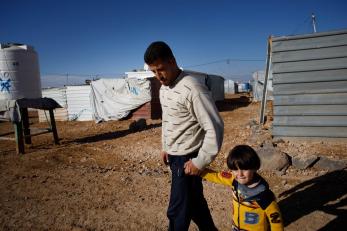
“It’s a hard situation, especially when you leave everything, when you leave home, when you leave your house that you built out of your own effort and your own blood. … I had a job and I lost it. I don’t know how I can feed my children. It was difficult to decide,” he says.
“If we had stayed, someone would have definitely died because of the conflict. … I’m very grateful to Jordan and for being here with my family. I have the most gratitude, just being together and living together.”
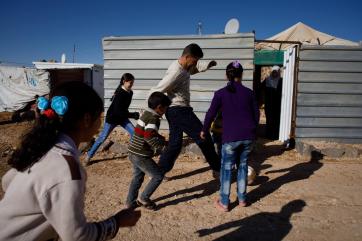
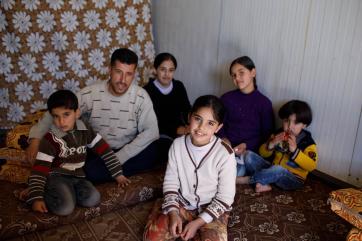
In a small classroom deep within the camp, Eman Ahmad Al-Mousa teaches and plays with a boisterous group of kids in a Mercy Corps youth center. Here, kids have a safe space to play and learn important life skills while living in the camp.
Eman was hired to clean the center but was quickly promoted to work with children as a facilitator. She arrived in Zaatari around the same time as Ibrahim, with her husband and seven daughters. They fled Daraa thinking they would be back home in a few weeks. Instead, she has watched her girls grow into teenagers in the camp; three months ago, she had a child here, her first son, Anas.
Zaatari is a hard, lonely place to be a parent, with unique challenges no one else can really understand. Every day is a struggle to preserve the small, normal parts of everyday life — homework, meals, chores — while being overwhelmed by reminders that your life is upside down. It’s an exhausting battle, even if, like Hayfaa, you have relatives in the camp with you: “They already had their kids and families and needed to take care of them. Because of that, I needed to handle the situation and deal with my children alone,” she says.
But as Eman began to watch the children under her care grow more confident, she slowly started to notice she was changing, too. The job was helping her become a better mother.
“The thing I love most about working with kids is I provide them psychosocial support and give them the opportunity to share their fear, their hope, and give them a safe space to talk about whatever they want,” she says. “This experience provides me support to be a better parent … Now I have high confidence in myself and can express myself directly without being shy.”
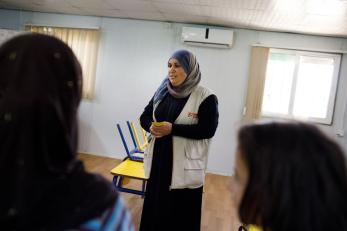
Almost every family in Zaatari, including Eman’s, arrived with nothing. It was a decision laced with urgency, but also practicality — there was no need to bring what you’d be going back to in a matter of days. But after so long, everything left behind has been taken. Their homes, if standing, are empty, the furniture and fixtures all gone. A new family is living inside Eman’s.
This is why, five years on, the question for many families in Zaatari is not necessarily what’s next, but what is there to go back to?
“I memorized every single tree I had in my garden,” Eman says. “We had a beautiful garden … we had orange trees, onions. We also had rabbits and doves.”
“I hope my daughters and my son remember Syria in a beautiful way, as a beautiful country, and not as a conflict country,” she says. “I hope when we return to Syria, it will be as we left it.”
That hope cannot bring back what is lost — the rabbits, the orange trees, her husband’s vegetable stand. These things exist now only in their memory, and accessing them means making one of the hardest choices a mother here can make: whether to let her daughters remember the war so they can remember where they came from. Because there cannot be one without the other.
And so every night, Eman’s daughters talk about the bombs. They make jokes. She doesn’t want them to talk about the war, partly out of how it could damage them, but also because of how it could damage their memory of home.
But memories, even hard ones, are essential because, in a life where so much has been lost, they are something to hold onto. The past is tangible; the future, unknowable. “I’m not overthinking what’s next,” Eman says. “The only thing I think about now is wanting to go back to the old Syria.”
It’s a wish for a life she knows is over, but also a dream that empowers her. A memory like that has the power to both draw you back and propel you forward. That’s why Eman holds another one close to her heart — a date: January 24, 2013. The date they arrived in Zaatari, 1,873 days ago.
“If [my children] forget this event, they would forget our history, they would forget our home,” she says. “So we should remember this to remember what we suffered for.”
This story is part of our special series, 7 for 7: Seven voices for seven years of the Syria crisis. View the complete series here ▸
